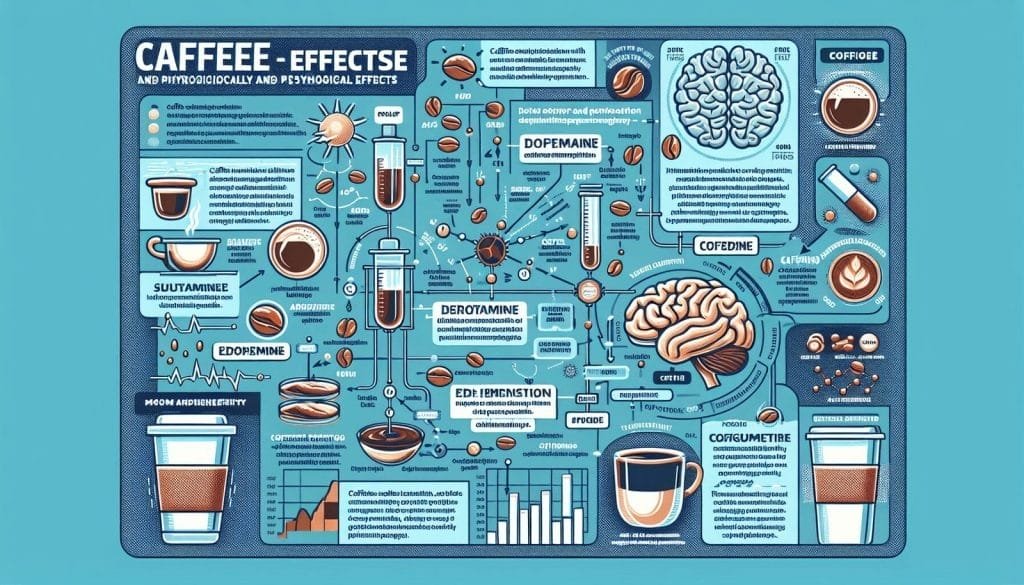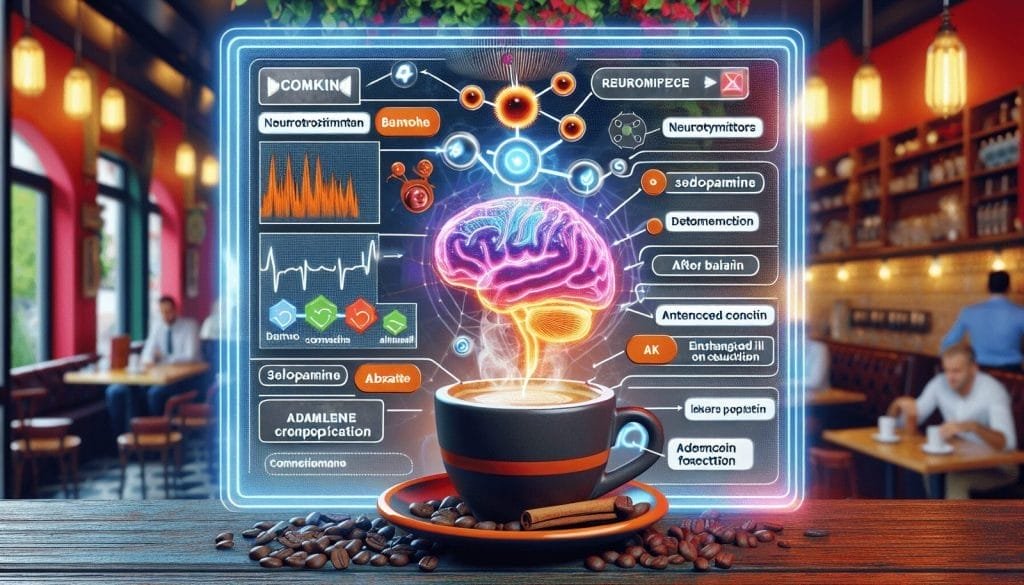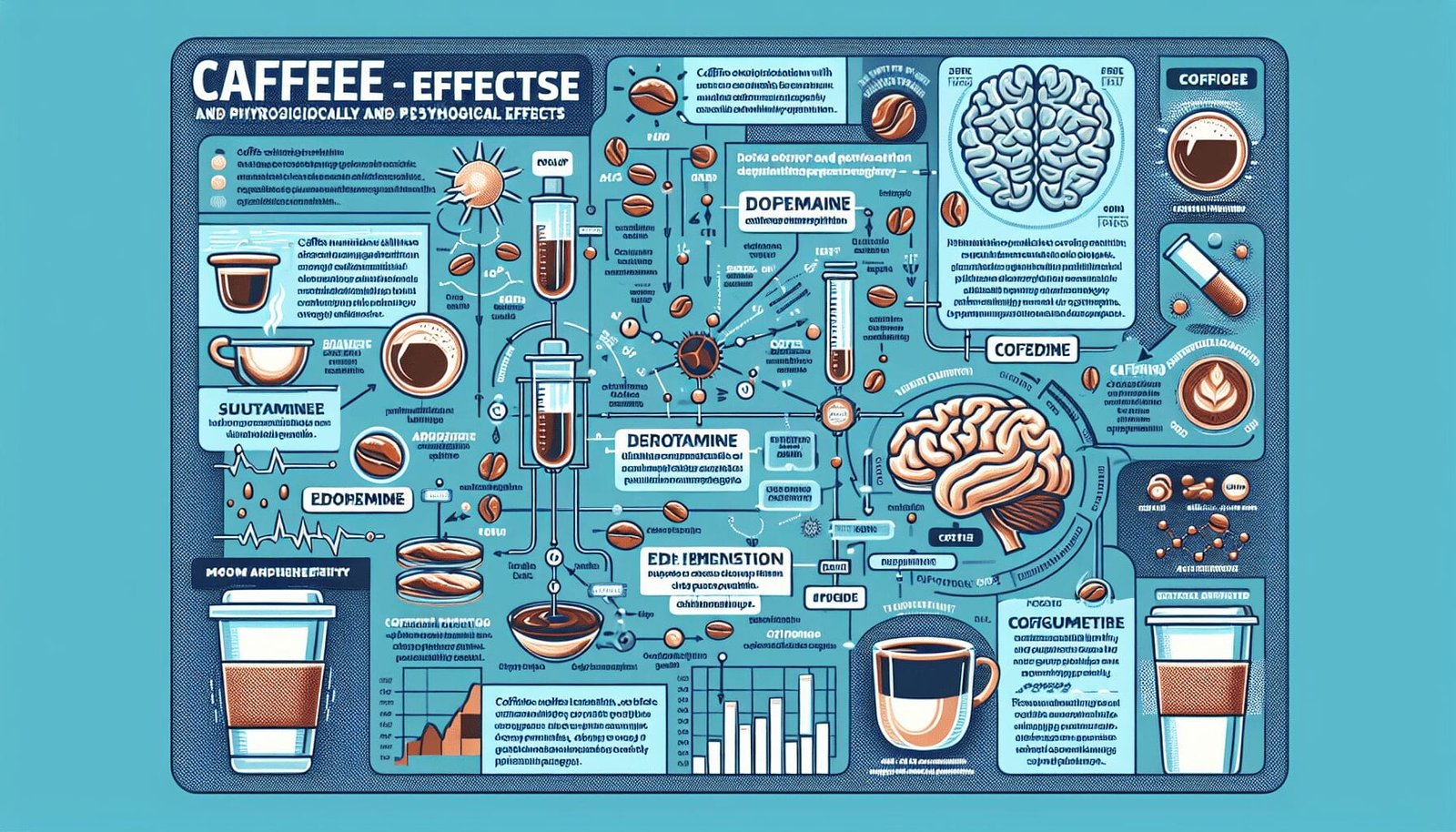Picture this: you take a sip of that rich, velvety coffee and suddenly, a surge of euphoria washes over you, lifting your spirits and filling you with a renewed sense of vigor. It’s like you’re on top of the world, unstoppable and ready to take on any challenge that comes your way. But have you ever stopped to wonder why that heavenly elixir we call coffee has such a profound effect on your mood and overall well-being? It’s a question that has puzzled scientists and coffee enthusiasts alike for centuries, and today, we’re going to explore the fascinating answer to this age-old mystery. So grab a cup of joe and prepare to embark on a journey into the captivating world of coffee-induced bliss.
Understanding Coffee
What is coffee?
Coffee is a popular beverage enjoyed by people all around the world. It is made from the seeds of the Coffea plant, which are roasted and ground to produce a flavorful and aromatic drink. The most commonly consumed type of coffee is made from the Coffea arabica species, known for its smooth and balanced taste. Coffee is known for its stimulating effects due to the presence of caffeine, a natural substance that affects the central nervous system.
Origins of Coffee
The history of coffee dates back centuries, with its origins in the highlands of Ethiopia. According to legend, a goat herder named Kaldi discovered the stimulating effects of coffee when he noticed his goats becoming more energetic after they ate the red berries from a certain tree. Intrigued by this observation, Kaldi brought the berries to a local monk, who made a drink from them. The energizing properties of coffee were soon recognized and spread throughout the Arab world and eventually to Europe and the rest of the world.
Different types of coffee
Coffee comes in various forms and flavors, catering to different tastes and preferences. Some popular types of coffee include espresso, Cappuccino, latte, and Americano. Espresso is a concentrated and strong coffee made by forcing hot water through finely ground coffee beans. Cappuccino is a combination of espresso, steamed milk, and frothed milk, creating a creamy and smooth texture. Latte is similar to cappuccino but with more milk, resulting in a milder flavor. Americano is made by diluting espresso with hot water, producing a drink with a flavor similar to brewed coffee. Each type of coffee offers a unique taste and experience, allowing coffee lovers to explore a wide range of flavors.
Coffee and the Brain
Coffee’s Effects on Neurotransmitters
Coffee has a profound impact on neurotransmitters in the brain, leading to its stimulating effects. One significant neurotransmitter affected by coffee is adenosine. Adenosine is responsible for promoting sleep and relaxing the brain. When coffee is consumed, the caffeine effectively blocks the adenosine receptors, preventing them from binding to adenosine molecules. This inhibition leads to increased alertness and wakefulness.
The role of caffeine in coffee
Caffeine is the primary active component in coffee responsible for its stimulating effects. It acts as a central nervous system stimulant, increasing alertness, and reducing fatigue. When consumed, caffeine is rapidly absorbed into the bloodstream and transported to the brain. It then blocks the actions of adenosine and stimulates the release of other neurotransmitters, such as dopamine and norepinephrine, further enhancing wakefulness and mood.
How the brain responds to caffeine
When caffeine reaches the brain, it binds to adenosine receptors, blocking their activity. This binding triggers the release of other neurotransmitters, such as dopamine, which plays a crucial role in regulating mood and motivation. Dopamine is associated with feelings of pleasure and reward, which explains why coffee can create a sense of well-being and satisfaction. Additionally, caffeine also increases the activity of norepinephrine, a neurotransmitter that promotes alertness and concentration.

The Biochemical Reasons Why Coffee Makes You Feel Good
Caffeine and Dopamine
One of the key reasons coffee makes you feel good is due to its interaction with dopamine. When caffeine binds to adenosine receptors in the brain, it indirectly increases dopamine release. Dopamine is known as the “feel-good” neurotransmitter, associated with pleasure, motivation, and reward. This release of dopamine contributes to the positive feelings and sense of well-being experienced after drinking coffee.
Caffeine and Adenosine
Coffee’s impact on adenosine is another biochemical reason why it makes you feel good. Adenosine is responsible for promoting sleep and relaxation by binding to specific receptors in the brain. By blocking these receptors, caffeine keeps adenosine from exerting its sleep-inducing effects. This leads to increased alertness and mental clarity, contributing to the overall positive feeling after consuming coffee.
Coffee and Antioxidants
Coffee is not only a source of caffeine but also a significant contributor of antioxidants in the diet. Antioxidants are compounds that protect our cells from damage caused by harmful molecules called free radicals. Coffee contains a variety of antioxidants, such as chlorogenic acid and caffeic acid, which have been found to have potential health benefits. These antioxidants can help reduce inflammation, protect against oxidative stress, and support overall well-being.
Mental Benefits of Coffee
Enhance Concentration and Focus
Coffee is well-known for its ability to enhance concentration and focus. The caffeine in coffee stimulates the central nervous system, increasing alertness and reducing fatigue. It helps individuals stay focused and engaged, making it an ideal companion during work or study sessions. By promoting wakefulness and improved cognitive function, coffee can enhance productivity and efficiency.
Improvement in Memory
Research suggests that coffee may have a positive impact on memory and cognitive function. Caffeine has been shown to improve memory consolidation, the process by which memories are formed and stored. It enhances the ability to retain and recall information, making it beneficial for tasks that require memory recall, such as studying for exams or remembering important details.
Coffee and Mood Enhancement
Coffee has the potential to elevate mood and promote a sense of well-being. The dopamine release triggered by caffeine contributes to feelings of pleasure and reward, enhancing overall mood. Additionally, the increased alertness and mental clarity provided by coffee can help improve motivation and reduce feelings of lethargy or low mood.

Physical Benefits of Coffee
Coffee and Exercise Performance
Coffee has been found to benefit exercise performance due to its stimulating effects on the central nervous system. The caffeine in coffee can increase adrenaline levels, which activates the body’s fight-or-flight response. This can lead to increased endurance, improved performance, and reduced perception of effort during physical activities. Additionally, coffee has been shown to help mobilize fatty acids from fat tissues, which can serve as a source of energy during exercise.
Metabolism and Coffee Consumption
Coffee has been associated with a potential boost in metabolism, although the effects may vary among individuals. Caffeine stimulates the nervous system, increasing the metabolic rate and enhancing fat oxidation. This can potentially lead to a modest increase in calorie expenditure. However, it is important to note that the effects of coffee on metabolism are not significant enough to replace a healthy diet and regular exercise.
Coffee and Digestion
Coffee has mild stimulatory effects on the digestive system, leading to increased bowel movements for some individuals. The caffeine in coffee can stimulate contractions in the colon, promoting regularity and relieving symptoms of constipation. However, excessive consumption of coffee may have a laxative effect, causing loose stools or diarrhea in some individuals. It is important to find the right balance and listen to your body’s response when it comes to coffee and digestion.
How Much Coffee Should I Drink?
Moderate Coffee Consumption
Moderate coffee consumption is generally considered safe and can provide the desired benefits without significant negative effects. The optimal amount of coffee varies from person to person, but consuming around 3 to 4 cups per day (equivalent to 300-400mg of caffeine) is generally considered moderate. It is important to note that certain individuals, such as those who are sensitive to caffeine or have certain medical conditions, may need to limit their coffee intake further.
Effects of Excessive Coffee Drinking
While moderate coffee consumption can be beneficial, excessive coffee drinking can have negative effects on health. Consuming large amounts of caffeine can lead to caffeine dependence, which may result in withdrawal symptoms when coffee is discontinued. Excessive caffeine intake can also lead to symptoms such as jitteriness, restlessness, increased heart rate, and difficulty sleeping. It is crucial to be mindful of your caffeine intake and listen to your body’s signals.
Finding Your Ideal Coffee Intake
The ideal coffee intake varies from person to person, depending on individual tolerance, sensitivity, and overall health factors. It is important to pay attention to how your body responds to coffee and find the right balance that works for you. Start by keeping track of your caffeine intake and observe how it affects your energy levels, sleep quality, and overall well-being. Adjust your coffee consumption accordingly until you find an intake that provides the desired benefits without any negative side effects.
Reducing Potential Side Effects of Coffee
Managing Caffeine Tolerance
Regular consumption of coffee can lead to caffeine tolerance, which means that the body becomes less responsive to the stimulating effects of caffeine over time. To manage caffeine tolerance, it is beneficial to periodically reduce or limit your overall caffeine intake. This can be done by gradually reducing the number of cups of coffee consumed or by choosing decaffeinated alternatives on some days. This helps maintain the desired effects of coffee while reducing the risk of tolerance and potential side effects.
Optimal times to drink coffee
The timing of coffee consumption can also play a role in mitigating potential side effects. It is generally recommended to avoid consuming coffee too close to bedtime, as caffeine can interfere with sleep quality and disrupt the natural sleep-wake cycle. The effects of caffeine typically peak within 30 to 60 minutes of consumption, so it may be beneficial to enjoy your coffee earlier in the day to allow enough time for the caffeine to metabolize before bedtime.
Method of coffee preparation to reduce side effects
The preparation method can also affect the coffee’s impact on your body. For individuals who are sensitive to acidity or experience digestive issues, opting for a cold brew or low-acid coffee can help minimize potential side effects. Cold brew coffee is known to have a lower acidity compared to hot brewed coffee, making it a gentler option for those with sensitive stomachs. Experimenting with different brewing methods and coffee varieties can help you find a preparation method that suits your preferences and minimizes any discomfort.
Coffee: Individual Differences and Tolerance
Genetic Factors Influencing Coffee Metabolism
Individuals have genetic variations that can affect how their bodies metabolize coffee. The enzymes responsible for the breakdown of caffeine can vary among individuals, leading to differences in caffeine sensitivity and metabolism. Some people may be considered “fast metabolizers,” meaning their bodies metabolize caffeine quickly, while others may be “slow metabolizers” who process caffeine at a slower rate. Genetic factors can influence the effects and tolerance of coffee, highlighting the importance of understanding individual differences.
Individual Differences in Caffeine Sensitivity
Caffeine sensitivity varies widely among individuals, with some people being more sensitive to its effects than others. Factors such as age, body weight, overall health, and medication use can influence individual caffeine sensitivity. It’s important to pay attention to how your body reacts to caffeine and adjust your coffee consumption accordingly. If you experience negative side effects or if caffeine affects your sleep quality or anxiety levels, you may need to limit your intake or opt for alternatives such as decaffeinated coffee.
Building a tolerance to coffee
Regular consumption of coffee can lead to the development of caffeine tolerance, where the body becomes less responsive to the effects of caffeine. Tolerance occurs when the brain’s adenosine receptors adapt to the constant presence of caffeine. To counteract tolerance, it can be beneficial to periodically reduce or limit your overall caffeine intake. This can help maintain the desired effects of coffee and prevent the need for higher doses to achieve the same level of alertness.
The Role of Coffee in Our Culture and Daily Routine
Coffee Consumption Statistics
Coffee holds a significant place in our culture and daily routine, with staggering consumption statistics worldwide. According to the International Coffee Organization, it is estimated that over 166 million bags of coffee are consumed globally each year. This highlights the widespread popularity and cultural significance of coffee in various parts of the world.
Coffee in Different Cultures
Coffee has become an integral part of different cultures, with unique traditions and rituals associated with its consumption. In many countries, coffee is enjoyed in social settings, such as cafes or during family gatherings. Cultures like Italy and Turkey have their own distinct coffee rituals, showcasing the significance of coffee in their daily lives. Understanding the cultural importance of coffee adds to the rich tapestry of its global consumption.
Ritual of Coffee Drinking
For many individuals, coffee has become more than just a beverage; it is a ritual that brings comfort and joy. The act of preparing and savoring a cup of coffee can be a mindful and relaxing experience. Whether it’s enjoying a quiet moment with a freshly brewed cup in the morning or meeting up with friends for a coffee break, these rituals contribute to the pleasure and satisfaction derived from coffee.
Summary and Key Takeaways
Mindful Coffee Consumption
Coffee can be a source of enjoyment and provide several benefits when consumed mindfully. Understanding its effects on the brain, body, and individual differences can help optimize coffee consumption for maximum benefit. Paying attention to personal tolerance, finding the right balance, and listening to your body’s signals are essential aspects of practicing mindful coffee consumption.
Benefiting from Coffee while limiting negatives
Coffee offers numerous mental and physical benefits, such as enhanced focus, improved memory, and potential performance boost during exercise. However, it is important to be aware of potential side effects and manage your coffee consumption accordingly. Finding the ideal amount, considering caffeine tolerance, and timing your coffee intake can help maximize the positives while minimizing any negatives.
Understanding your personal coffee-response
Individual differences play a crucial role in how coffee affects each person. Factors such as genetics, caffeine sensitivity, and metabolism contribute to the variations in how individuals respond to coffee. It is important to be aware of these differences and pay attention to your body’s responses. Experimenting with different brewing methods, varieties, and timing can help personalize your coffee routine and optimize your experience.




